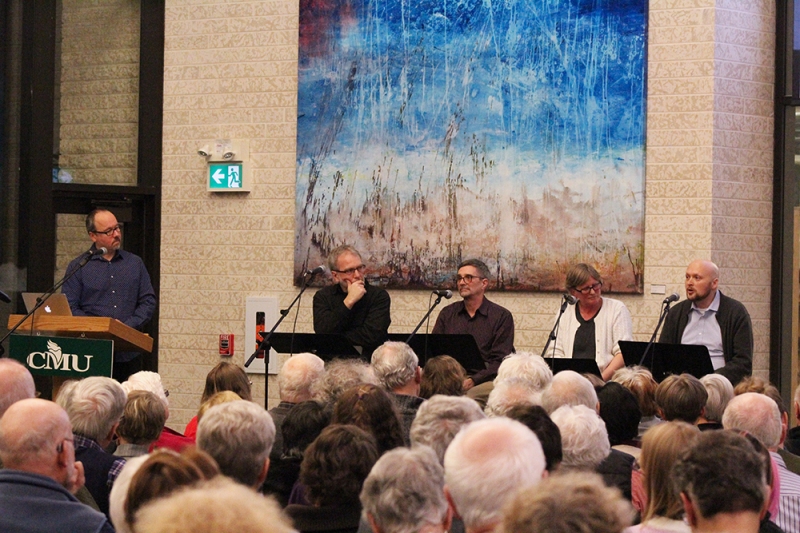
Dealing with death together is better than alone
 Assistant Professor of Communications and Media David Balzer (left) moderates "Let's Talk about Death...it Won't Kill You" with panelists Rick Zerbe Cornelsen, Doug Koop, Angelika Jantz, and Michael Boyce
Assistant Professor of Communications and Media David Balzer (left) moderates "Let's Talk about Death...it Won't Kill You" with panelists Rick Zerbe Cornelsen, Doug Koop, Angelika Jantz, and Michael Boyce
It will happen to all of us, but we don't like to talk about it.
Death and dying were the topics of conversation at the final Face2Face community discussion held at Canadian Mennonite University (CMU) on February 8.
"Let's Talk about Death...it Won't Kill You" brought together a diverse audience at Marpeck Commons and online via live streaming. Four panelists discussed how they relate to death on a daily basis, what insights this has given them, and how a deeper understanding of death may enrich our living.
Regardless of how a person is dying, it is difficult for all those involved.
"Death is unavoidable. It is the great leveler," said Doug Koop, a spiritual health practitioner. "Death happens to individuals. But it affects communities."
"It has a social impact. Friends and family members may well be exposed to the process of dying and this can be uncomfortable and disconcerting at many levels."
Talking about death creates the opportunity for honest conversation.
"I am making something that becomes a part of someone else's story," said Rick Zerbe Cornelsen, a casket and urn maker. "But what I love more is the quality of the encounters I have with people in my shop. They inspire me."
Those encounters are not only special for Zerbe Cornelsen, but pivotal for those processing death.
"When death eventually shows up around us, facing it together is better than fleeing from it. Doing so gives us a taste of living openly and honestly."

Society's attitude of alienation and ruthlessness play into how we view death.
"Our culture puts an emphasis on self-improvement and individual wellbeing," said Angelika Jantz, a death café participant. "If we just do all the right things, we'll live with a strong body and mind, we will live a long life. In this perspective, death is defeat. A result of bad luck or poor choices."
She asked, "How would it be if aging and dying were seen as a natural part of being human and something we all have in common?"
Pop culture takes the topic of death further in a society that lacks experience with death.
"Why are people interested in TV shows like The Good Place speculating about the after-life and what comes next? While at the same time, in our regular everyday life we are terrified to talk about dying and death," said Michael Boyce, associate professor of English and Film Studies at Booth University College.
He adds, hospital dramas such as Grey's Anatomy or police dramas emphasizing the cadaver as the central story narrative remain popular.
To engage the live and online audience an interactive Q & A and polling app was available. Watch a recording of the February 11 event below and visit cmu.ca/face2face for more on past and future discussions.
Started in 2013, Face2Face is a series of conversations organized by CMU, designed to engage the community on a wide variety of current events and issues at the intersection of faith and life.
Face2Face will return with a new series of conversations in fall 2019.
Story by Tammy Sawatzky, a Winnipeg-based communications professional.
Printed from: media.cmu.ca/face2facefeb2019review